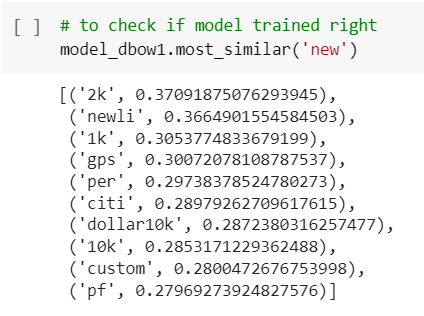I am new to machine learning and tried doc2vec on quora duplicate dataset. new_dfx has columns 'question1' and 'question2' which has preprocessed questions in each row. Following is the tagged document sample:
input:
q_arr = np.append(new_dfx['question1'].values, new_dfx['question2'].values)
tagged_data1 = [TaggedDocument(words=word_tokenize(_d.lower()), tags=[str(i)]) for i, _d in enumerate(q_arr)]
tagged_data1[50001]
output:
TaggedDocument(words=['senseless', 'movi', 'like', 'dilwal', 'happi', 'new', 'year', 'earn', 'easi', '100', 'crore', 'india'], tags=['50001'])
Input:
model_dbow1 = Doc2Vec(dm=1, vector_size=300, negative=5, workers=cores)
model_dbow1.build_vocab([x for x in tqdm(tagged_data1)])
train_documents1 = utils.shuffle(tagged_data1)
model_dbow1.train(tagged_data1,total_examples=len(train_documents1), epochs=30)
-- to check if model trained right
model_dbow1.most_similar('senseless')
Error:
KeyError: "word 'senseless' not in vocabulary"
The data I have given to model for training as input has the word "senseless" so why this error? Could anyone please help?
